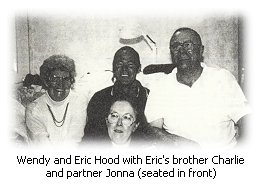Memories ... Eric Hood
Focus on Castledare
It was in 1952 when Eric Hood arrived at Castledare ... the memories of a boy from the time he was seven tend to focus somewhat on the fun and games, the pranks, and the food - both that which tasted good and that which was sometimes not so good (finding weavils and maggots in the breakfast cereal fitting into the latter category).
But where there's a will, there's a way for hungry growing boys - "We used to steal biscuits out of large potato sacks and turnips and suedes as well - which we ate raw! To pick oranges off the trees, we'd form a gymnastic-style human pyramid".
Sometimes a large bag of walnuts would be put onto the oval and the boys would swoop on them as Eric recalls "like a pack of scavengers".
To burn off the energy of the spoils of the scavenger hunts, Eric loved his sport. He enjoyed football, cricket, and handball, and "wasn't too bad at swimming".
Walking along the path of the bordering river was a less exhuberant way of expressing youthful energy but nevertheless an activity which brought great joy.
"We used to go on lovely walks along the river. There were no houses then ... just reeds. We walked regularly from Castledare to Clontarf. Often we went all the way to Acquinas".
Indoors, Eric discovered a love of drama - and singing - and with a voice to do justice to his musical passion, he contributed to Castledare taking away the gold on more than one occasion at the annual Eistedfod competitions.
The quest for "boys just wanting to have fun" found another outlet when it came to doing the chores. Floor polishing took on the proportions of a game as the boys gave each other slides (ostensibly to buff the red floor wax which has previously been applied) by pulling each other across on blankets from side of the floor to the other.
Acknowledging the good times, Eric also admits to a difficult time or two -- and remembers the physical punishments administered in the class rooms -- to any child who made any mistake.
It still puzzles him as to why the punishments were so severe -- "usually in the form of a strong clout or a punch under the ear for any type of mistake".
But all in all, he considers himself to have been one of the lucky ones apart from anything else, because his family knew where he was and kept in touch. "I was lucky to get lovely gifts and food parcels from my mother. I felt sorry for those that didn't".
He also had the opportunity to maintain personal contact with his sister Georgie who was living at St Joseph's. On field days Eric would not only be given money to spend but he could spend time with his sister who lived not too far away.
Now, at age 53, Eric maintains a positive outlook on his life. His love of nature translates into a job (which he has held for the past 25 years) which takes him out into the bush at regular intervals.
His love and sense of connection with his family or origin took him to England last year to meet up with his brother Charlie.
Eric and his partner Wendy are now saving up to either help fund another trip to England, or to help Charlie to pay a visit to Western Australia in spring, "when the wildflowers are just phenomenal!".


|



